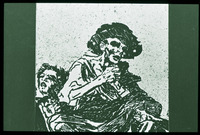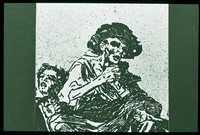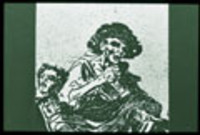The Worst is to Beg
The Disasters of War #55
| dc.creator | Goya, Francisco de | en_US |
| dc.date.accessioned | 2007-11-19T17:44:34Z | |
| dc.date.available | 2007-11-19T17:44:34Z | |
| dc.identifier | 026411 | en_US |
| dc.identifier.uri | http://hdl.handle.net/1721.3/23042 | en_US |
| dc.description | There are three main groups in the Disasters of War series. The scenes of famine in Madrid are depicted in plates 48-64.Goya’s 82 Disasters of War prints, on which he worked from 1810 until 1820, were etched from red chalk preparatory drawings. They record moments during the Peninsular War and its aftermath while compellingly projecting universally appalling horrors. The initial scenes illustrate the death and destruction Goya witnessed when called to Saragossa in October 1808, each print bearing a succinct comment: This I Saw (pl. 44), All This and More (pl. 7), Bury Them and Keep Quiet (pl. 16) and, simply, Why? (pl. 49). With plate 48 (The Same) there appear less violent scenes of devastation and death that he observed during the famine of 1811–12 in Madrid. Plates 65 to 77 present bitterly satirical and anti-clerical ‘emphatic caprices’, such as This Is the Worst of All (pl. 74). The personification of Truth as an innocent young woman (the Death of Truth and Will She Arise Again?, pls 79–80) culminates in the final plate (This Is the Truth, pl. 82), in which she is standing before an aureole of light in a peaceful countryside accompanied by a bearded, bent farmer and a lamb. This scene might be considered an affirmation of Voltaire’s conclusion to Candide (‘we must cultivate our garden’) and, by extension, an affirmation of the belief that Adam’s neglect in cultivating the gardens of Paradise led to the suffering from which humanity could be redeemed only through Christ, son of the Virgin, here evoked in Goya’s figure of Truth. (PRISCILLA E. MULLER: 'Goya, Francisco de, §I, 3: The mature Goya, 1793–1819', The Grove Dictionary of Art Online, ed. L. Macy (Accessed [7 August 2003]) <http://www.groveart.com>) | en_US |
| dc.description | detail, beggar | en_US |
| dc.format.extent | 15.5 x 20.5 cm (6.1 x 8.07 inches) | en_US |
| dc.format.medium | ink | en_US |
| dc.relation.ispartof | 120430 | en_US |
| dc.subject | Disasters | en_US |
| dc.subject | Hunger | en_US |
| dc.subject | Starvation | en_US |
| dc.subject | Wars | en_US |
| dc.subject | Beggars | en_US |
| dc.subject | Dead | en_US |
| dc.subject | Series (Groups) | en_US |
| dc.subject | Goya, Francisco, 1746-1828. Disasters of war | en_US |
| dc.subject | Madrid (Spain) | en_US |
| dc.subject | Napoleonic Wars, 1800-1815 -- Campaigns -- Spain | en_US |
| dc.subject | Art, Spanish --19th century | en_US |
| dc.title | The Worst is to Beg | en_US |
| dc.title | The Disasters of War #55 | en_US |
| dc.title.alternative | Los Desastres de la Guerra: Lo peor es pedir | en_US |
| dc.type | Image | en_US |
| dc.rights.access | All rights reserved | en_US |
| dc.publisher.institution | Repository: Boston Public Library (Boston, Massachusetts, United States) ID: 1084 | en_US |
| vra.culturalContext | Spanish | en_US |
| vra.technique | engraving (printing process) | en_US |
| vra.worktype | Engraving (print) | en_US |
| dc.contributor.display | engraver: Francisco de Goya (Spanish, 1746-1828) | en_US |
Files in this item
This item appears in the following Collection(s)
-
Architecture, Urban Planning, and Visual Arts
Online Image Collection



